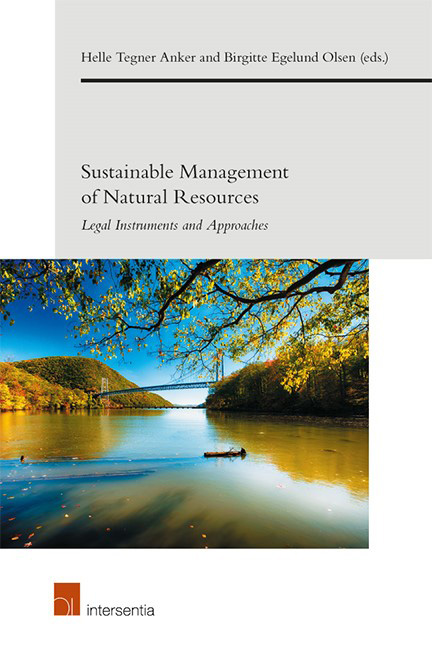Book contents
- Frontmatter
- Contents
- PART I INTRODUCTION
- PART II SUSTAINABILITY IN EU AND INTERNATIONAL LAW
- PART III SUSTAINABLE MANAGEMENT OF WASTE
- PART IV ENVIRONMENTAL AND CLIMATE LITIGATION
- PART V ECOSYSTEM APPROACHES AND ADAPTIVE MANAGEMENT
- Chapter 9 Managing Environmental Utilisation Space in the Dutch Environment and Planning Act
- Chapter 10 Reconciling Adaptive Management Strategies with the EU Nature Directives: the Unfortunate Case of the Dutch Integrated Approach to Nitrogen
- Chapter 11 Balancing Nature Protection and Other Public Interests: the Czech Example
- PART VI SUSTAINABLE RESOURCE MANAGEMENT: SPECIFIC ISSUES 193
Chapter 10 - Reconciling Adaptive Management Strategies with the EU Nature Directives: the Unfortunate Case of the Dutch Integrated Approach to Nitrogen
from PART V - ECOSYSTEM APPROACHES AND ADAPTIVE MANAGEMENT
Published online by Cambridge University Press: 31 January 2019
- Frontmatter
- Contents
- PART I INTRODUCTION
- PART II SUSTAINABILITY IN EU AND INTERNATIONAL LAW
- PART III SUSTAINABLE MANAGEMENT OF WASTE
- PART IV ENVIRONMENTAL AND CLIMATE LITIGATION
- PART V ECOSYSTEM APPROACHES AND ADAPTIVE MANAGEMENT
- Chapter 9 Managing Environmental Utilisation Space in the Dutch Environment and Planning Act
- Chapter 10 Reconciling Adaptive Management Strategies with the EU Nature Directives: the Unfortunate Case of the Dutch Integrated Approach to Nitrogen
- Chapter 11 Balancing Nature Protection and Other Public Interests: the Czech Example
- PART VI SUSTAINABLE RESOURCE MANAGEMENT: SPECIFIC ISSUES 193
Summary
ABSTRACT
The concept of adaptive management is generally defined as a flexible decisionmaking process that can be adjusted in the face of uncertainties as outcomes of management actions and other events become better understood. One notable application of adaptive management in the context of EU protected nature is the Dutch Integrated Approach to Nitrogen (Programma Aanpak Stikstof – PAS), which entered into force in 2015 and puts forward a more reconciliatory and integrated approach towards permitting additional nitrogen emissions in the vicinity of Natura 2000 sites. In this paper, the Dutch PAS is used as a benchmark to explore the margins available within the EU Nature Directives to implement more flexible adaptive management strategies. The paper concludes that the Dutch PAS is not to be approached as an illustration of an effective adaptive management strategy since, amongst others, it stands at odds with the preventative underpinnings of the EU Nature Directives.
INTRODUCTION
Nitrogen deposition impact describes the input of reactive nitrogen from the atmosphere to the biosphere both as gas, dry deposition, and in precipitation as Fwet deposition. Since the start of the 20th century, the sharp increase in humaninduced nitrogen emissions, prompted by the rise of industrial agriculture, has significantly altered the natural nitrogen cycle. Recent research has depicted that human activities currently contribute twice as much terrestrial nitrogen fixation as natural resources. As far as the environmental impact of elevated nitrogen deposition is concerned, it has been firmly established that it leads to eutrophication of ecosystems, which in turns causes an increased availability of nitrogen and subsequent exclusion of other species by more nitrophilous plants. According to the findings of the European Environmental Agency (EEA), approximately 50 per cent of all vulnerable natural or semi-natural habitats in the EU are expected to be at risk of excessive nitrogen deposition in 2020.
In the search for more sustainable management practices for natural ecosystems within the European Union, a proliferation of adaptive and/or programmatic approaches is to be noted. Since such strategies allow for a more flexible and adaptive approach to permitting policies, they are increasingly favoured by government agencies over more static, ad hoc-approaches to decision-making schemes in the context of degraded ecosystems. This has also been the case in the context of the management of nitrogen deposition loads in vulnerable ecosystems.
Information
- Type
- Chapter
- Information
- Sustainable Management of Natural ResourcesLegal Instruments and Approaches, pp. 155 - 176Publisher: IntersentiaPrint publication year: 2018
